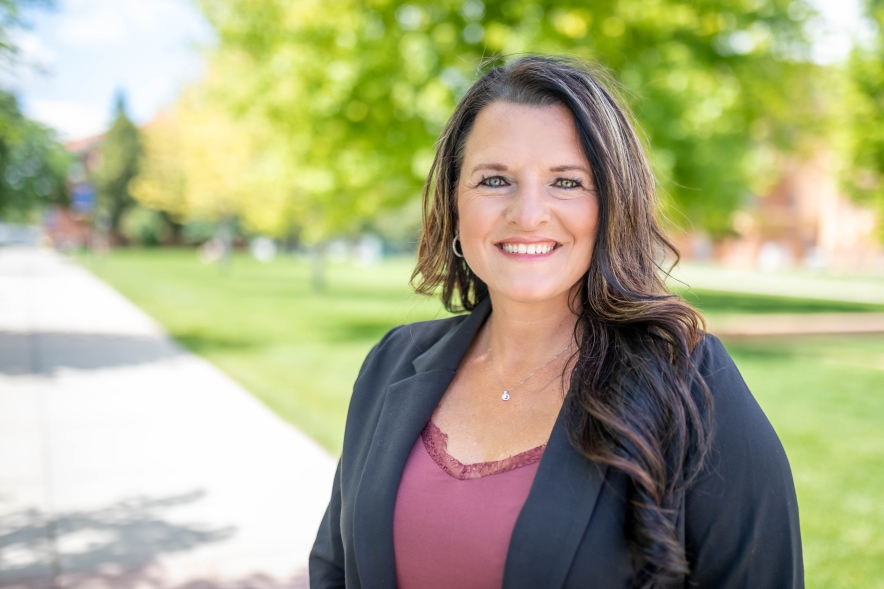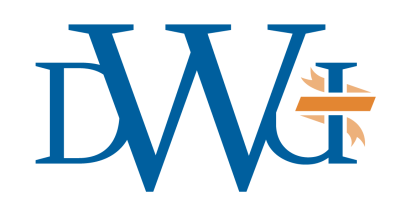Accelerated and GROW YOUR POTENTIAL
LPN-B.S.N. in Sioux Falls
What kinds of jobs and specialties await you when you earn your Bachelor of Science degree in Nursing (B.S.N.)?
Hospital registered nurse
Clinical nurse
Public health nurse
Nursing
director
Nurse educator
What’s the Difference at DWU?
-
Accelerated
With a mix of fast-paced, in-person and online classes, you’ll earn your B.S.N. in 28 months or less. -
Clinicals
You’ll gain hands-on experience through valuable clinical experience that will grow your capacity as a nurse. -
30 Credits
As an LPN, 30 credits will automatically transfer from your LPN program. -
Sioux Falls
In-person classes will be located downtown Sioux Falls at 114 S. Main Street. -
Personal
With a small class size, you’ll belong to a group of professional nurses who support your learning and development every step of the way. -
Confidence
DWU nursing graduates have a high pass rate with the National Council of State Boards of Nursing Licensing Exam for Registered Nurses (NCLEX-RN). After you graduate, you will be ready for the exam. Plus, with a Bachelor of Science degree in Nursing (B.S.N.), you will be better prepared to serve patients and enjoy more employment opportunities, career advancements and higher pay.
Accreditation
The baccalaureate program at Dakota Wesleyan University is accredited by the Commission on Collegiate Nursing Education (CCNE), 655 K Street NW, Suite 750, Washington, DC 20001, 202-887-6791. The Dakota Wesleyan University LPN-B.S. Nursing program has been granted full approval status by the South Dakota Board of Nursing, 4305 S. Louise Ave., Suite 201, Sioux Falls, SD 57106-3115, 605-362-2760.
Nursing Admission Requirements
Admission to the LPN-B.S. Nursing Program is contingent upon completing the following requirements:
- Active, unencumbered LPN license to practice nursing in South Dakota. The LPN degree must have been granted from an accredited institution of higher education. You will need to provide a current copy of your SD LPN license. You will be granted 30 credits for your LPN license.
-
Transcripts
- An official copy of all college transcripts.
- If coursework is still in progress, attach a current transcript that documents all of the courses in progress from that institution.
- A cumulative grade point average of 2.7 or above in college, university, vocational or technical school is required.
Essays, exams and references are not required.
Post-Admission Requirements
Once you have been accepted and confirmed your spot in the program, you will need to complete the following steps before class begins.
- Immunizations and Immunization Records
- Immunizations and immunization records are required prior to participating in clinical rotations. These include (2) MMR or titers proving immunity, Hepatitis B series & Hepatitis B Titer (Hep B Surface Antibody), Tdap vaccinations, Varicella vaccination, annual Tuberculosis testing (QuantiFERON TB Blood Test is required), and an annual influenza vaccination. Covid-19 vaccinations are per guidelines/requirements of clinical facilities.
- Physical Evaluation
- Physical evaluation is required for new nursing students (and returning nursing students).
- CPR Certification and Renewal
- Incoming nursing students must be CPR certified. The American Heart Association course, HeartCode® BLS (Basic Life Support for Healthcare Providers CPR) is required. BLS must have a hands-on training component.
- Criminal Background Check
- Department of Nursing requires criminal Background checks on all incoming, accepted nursing students. Background checks are completed before taking the first nursing course and before beginning clinical rotations in a health care agency. Instructions will be provided to you upon acceptance.
- Major Medical Health Insurance
- Dakota Wesleyan University's contractual agreements regarding clinical experiences with cooperating agencies require that all nursing students be covered under a major medical health insurance policy throughout the entire calendar year. If you are 26 or under and are covered under a parent’s medical insurance policy, you will need to verify with your parent’s insurance agent that coverage applies to you while attending DWU.
All costs associated with these requirements are the student’s responsibility.
Ready to apply? Complete our free application now.
Need more information? Let’s connect!
“Our program offers a more efficient path to completion, with fewer required credits than other Sioux Falls-based options. This means you'll graduate earlier and at a lower overall cost.”
– Penny Tilton, DNP, M.S.N., RN
Associate Professor of Nursing
Administrative Chair of Nursing
Course List
Classroom simulations will be mixed with online courses. A total of 123 credits are required for graduation, which include:
- 30 non-nursing credits are accepted for a licensed LPN nursing degree from an accredited nursing program
- 54 nursing core credits
- 39 non-nursing general education and support courses
Nursing Core - 54 Credits
NUR 218 Introduction to Professional Nursing Concepts
NUR 316 Nursing Concepts in Pathophysiology
NUR 318 Concepts in Nursing Leadership
NUR 320 Fundamental Nursing Concepts II
In addition, the Mitchell Campus must take NUR 310.
NUR 321 Health Assessment Nursing Concepts
NUR 326 Nursing Concepts in Pharmacology
NUR 332 Nutrition Concepts in Health and Illness
NUR 342 Mental & Social Health Nursing Concepts
NUR 408 Advanced Nursing Concepts
NUR 411 Lifespan Nursing Concepts I
NUR 412 Lifespan Nursing Concepts II
NUR 418 Concepts in Nursing Management
NUR 423 Complex Nursing Concepts
NUR 426 Nursing Concepts in Population Health
NUR 440 Nursing Concepts in Research
NUR 450 Transition to Professional Practice
If you have taken general education courses in the past, you may be able to move right into the nursing core courses. Review the LPN-B.S.N. Plan of Study and visit with your admissions counselor to discuss your options.
For other academic policies, see the DWU catalog.
Get to Know Your Professors
With our low student-to-teacher ratio, you will be supported every step of the way.
Anastasia Barber, M.S.N., RN
Melissa Coull, M.S.N., RN
The Experience
Clinical experience is critical to your career. We have included clinical opportunities in almost every semester. With clinical hours, you can practice your skills as you learn them.
The LPN-B.S.N. curriculum is designed to build on the foundational nursing skills you have already mastered as a licensed practical nurse (LPN). The goal is to move your knowledge of human health needs and nursing interventions to a deeper level. The program content is designed to develop leadership and management of care skills needed by the registered nurse (RN) in the current healthcare practice setting.
Nursing Mission Statement, Vision and Core Values
Arlene Gates Department of Nursing Mission Statement
The Arlene Gates Department of Nursing, as an integral part of Dakota Wesleyan University, is aligned with its mission, vision, values, and philosophy. The nursing department aspires to prepare students for meaningful careers in professional nursing within a liberal arts setting. The nursing department aspires to cultivate a challenging learning environment based on Christian values and acceptance of diversity. The faculty foster lifelong learning, professional development, and responsibility to service.
Arlene Gates Department of Nursing Vision
The Vision of the Arlene Gates Department of Nursing is to strategically develop and grow DWU nursing programs to further the practice of professional nursing throughout the region.
Arlene Gates Department of Nursing Core Values
The Mission, Vision and Philosophy of the Arlene Gates Department of Nursing are carried out with guidance from AACN’s Core Competencies for Professional Nursing Education (AACN, 2019). The core values for nursing are human dignity, integrity, autonomy, altruism, and social justice.
Program Learning Outcomes
The Program Learning Outcomes are supported by AACN’s The Essentials: Core Competencies for Professional Nursing Education (AACN, 2019). Based on ten domains that represent the essence of professional nursing practice and expected competencies for each domain, four spheres of care are articulated. The domains, competencies and spheres of care lend a uniqueness to the profession of nursing, and diversity to practice (AACN, 2019) while providing a guide for the nursing curriculum toward outcomes-based learning.
The four spheres of care are:
- disease prevention/promotion of health and wellbeing
- chronic disease care
- regenerative or restorative care
- hospice/palliative/supportive care across the lifespan
The domains and competencies allow the learner to build knowledge, skills, and abilities for entry into professional practice. The Essentials also features eight overarching concepts which are fundamental to professional nursing practice and are integrated within and across the domains and competencies. The Essentials serve as a guide for the DWU nursing programs’ program learning outcomes.
The Program Learning Outcomes are as follows:
- Teach graduates to independently provide culturally sensitive, competent nursing care in a variety of settings guided by a scientific concept-based curriculum and professional accountability.
- Develop graduates who incorporate critical thinking and clinical judgement in the provision of holistic, evidence-based nursing care of clients throughout the lifespan.
- Support graduates in the planning and providing of person-centered, coordinated nursing care that contributes to safe and high-quality care outcomes.
- Facilitate graduates who communicate and collaborate with inter-professional teams, utilize health information technology, incorporate cost-effectiveness, and utilize educational principles to promote wellness and well-being.
- Motivate graduates to be committed to lifelong learning and service, display leadership, and who participate in scholarships that advance the profession of nursing.
- Produce graduates who exhibit caring behaviors and who uphold moral ethical and ethical competence in the practice of nursing.
Program Goals
- The programs’ three year mean for NCLEX-RN pass rates will be at or above the minimum standard of 80% required by the nursing programs’ accrediting body (CCNE) Collegiate Commission on Nursing Education.
- The programs’ three year mean for NCLEX-RN pass rates will be above the minimum standard of 75% required by the programs’ licensing body the (SDBON) South Dakota Board of Nursing.
- Seventy percent (70%) of students admitted into the B.S.N. program will graduate within five years through achievement of one of the CCNE standards found in standard IV-B.
- Seventy percent (70%) of students admitted into the LPN to B.S.N. program will graduate within four years through achievement of one of the CCNE standards found in standard IV-B.
- Ninety percent (90%) of graduates who are actively seeking employment in nursing will be employed as a practicing registered nurse at six to twelve months post-graduation.
- At six to twelve months post-graduation all items on the graduate survey will receive a mean of 3.0 or higher.
LPN-B.S.N. Transfer Credits
Are you a transferring from another institution? Great! DWU accepts and welcomes students from other accredited colleges and universities approved by the U.S. Department of Education.
If you meet admission requirements for the LPN-B.S.N. program, you will earn 30 transfer credits for your LPN license. The remaining 54 nursing credits and 39 non-nursing general education and support courses are included in the LPN-B.S.N. Plan of Study.
Coursework completed at other colleges or universities may meet one or more of the required general education or support courses. The DWU registrar's office will evaluate your official transcript to ensure transferred credits meet requirements for the degree. Keep in mind, the credit can be no older than 10 years and other catalog conditions for transfer credits may apply.
LPN-B.S.N. Program Costs
Program Tuition: $400/Credit Hour
Nursing Credits (54): $21,600
General Education Credits (39): $15,600
Nursing Clinical Fee: $1,785
TOTAL TUITION AND FEES: $38,985
Other anticipated expenses (estimated and subject to change):
- Background check: $87 | You must complete a background check within 30 days of the start of the first nursing course. The cost of the background check is your responsibility.
- Uniform: $40 | You are responsible for the purchase of one royal blue scrub uniform. This is an approximate cost.
- Nursing Textbooks: Approx. $1,379 | This includes the cost of nursing textbooks for the entirety of the program.
- Other Textbooks: varies based on your schedule and course requirements.
- CPR Certification: $55-$65 | This covers a required CPR course provided by the American Heart Association Basic Life Support for Health Care Providers.
- RN Licensure Fee: $100 | This fee is due to the South Dakota Board of Nursing upon graduation.
- NCLEX-RN Exam: $200 | This is the registration fee to Pearson Testing upon graduation in order to take your exam.
Complete your FAFSA Online
Complete your FAFSA online to begin the financial aid process and to determine the various types of aid you may qualify for to help finance your education. Dakota Wesleyan University’s code for the Free Application for Federal Student Aid (FAFSA) is 003461.
Several payment plan options are available for you:
- Online with a checking account or credit card
- Monthly payment plan
- Check or money order
- PLUS or alternative loan
Are you a member of the United Methodist Church? Students enrolled in the LPN-B.S. program are eligible for the United Methodist Recognition Award, a $1,000 annual scholarship awarded to confirmed members of the United Methodist Church. You must be a member for at least one year and a certification form is required.
















